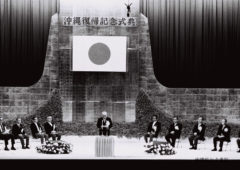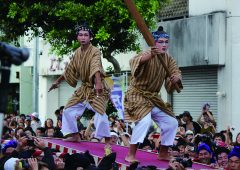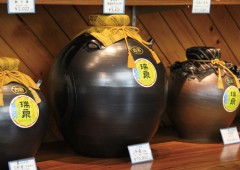2013.10.20
Leaders ignore revising Status of Forces Agreement
U.S. and Japanese Defense and foreign affairs leaders put their heads together in Tokyo, but one key topic that failed to hit the center of the table was changes in core issues of the Status of Forces Agreement.
Japanese Foreign Minister Fumio Kishida and Defense Minister Itsunori Onodera met with U.S. Secretary of State John Kerry and U.S. Secretary of Defense Chuck Hagel for several days of two-plus-two meetings on defense cooperation guidelines, but the SOFA, never formally revised in more than five decades, was not mentioned. Officials say the agreement does need change because of changes in political relationships, military technological changes , economics and of course, conditions in the Pacific region.
The SOFA hasn’t changed since being signed in 1960. Before the meetings by the four Japanese and American leaders, governors from 14 prefectures where American military installations are located had submitted lists of questions and proposed revisions to the SOFA. The governors were not invited to participate in the meetings, or even attend. One thing the governors were asking for was an opportunity to reevaluate why the bases are in Japan, why they’re needed, and how they could improve base-related conditions.
Although the four leaders were praising one another for all the good things being done, they avoided talk of controversial environmental conditions on bases. Even in Okinawa, where Agent Orange has been alleged to have been stored, everything remains secret. The 50-year-old SOFA says such issues do not have to be discussed.
Likewise, noise pollution has irritated citizens from Okinawa to Misawa, with flight patterns and noise generating frequent complaints. Here, introduction of the MV – 22 Osprey is of concern, but not being talked about. Governors want to talk of these issues, as well as a perpetual problem: the handling of American servicemen and women accused of committing crimes. Under the current SOFA, the U.S. has virtual control; the governors and other political leaders are clamoring for a change that would require the U.S. to surrender suspects to Japanese authorities, with assurances they’ll be treated the same as they would be in the U.S. That would mean changing Japanese law governing treatment of suspects by having a lawyer present during questioning and by taping the entire interrogation process, something not now the case in Japan. If Japan were to concede this point, the U.S. military would find it difficult to refuse handing over suspects to the jurisdiction of the Japanese legal system.

 2024.07.07
2024.07.07 2024.06.21
2024.06.21 2024.05.15
2024.05.15 2024.02.07
2024.02.07 2024.01.31
2024.01.31 2023.11.02
2023.11.02 2023.10.26
2023.10.26 2023.09.29
2023.09.29 2023.09.01
2023.09.01






